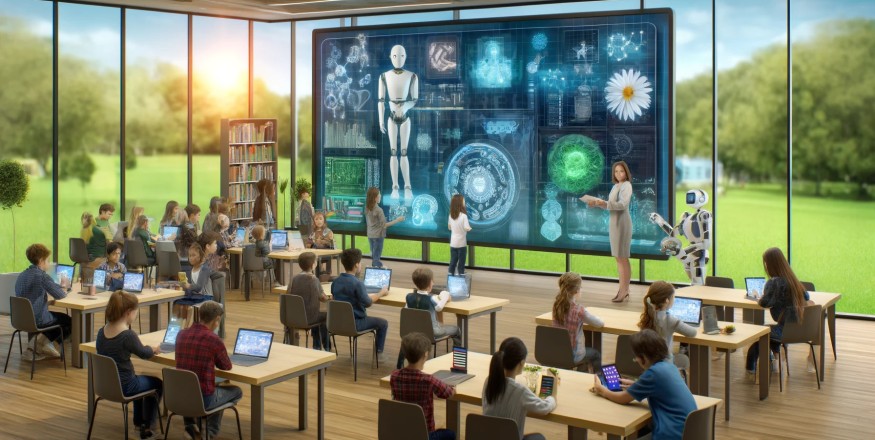-
info_outline Info
-
toc Table of Contents
-
share Share
-
format_color_text Display Settings
-
exposure_plus_1 Recommend
-
 Sponsor
Sponsor
-
report_problem Report
-
account_circle Login

The digital revolution, spearheaded by advancements in artificial intelligence (AI), is reshaping the landscapes of numerous industries, and education is no exception.
In the realm of edtech, AI's promise extends beyond mere automation, offering personalized learning experiences, enhancing accessibility, and redefining the traditional classroom.
For educators and institutions aiming to remain at the forefront of teaching innovation, understanding the implications, benefits, and challenges of AI in education is paramount.
As we delve into this transformative era, partnering with a custom edtech development company or an education software development firm could be crucial in navigating these changes.
Understanding AI in Education
Artificial Intelligence, or AI, refers to machines programmed to think and learn like humans. Within the educational sector, its application ranges from personalized learning platforms facilitated by a generative AI development company to AI tutors designed by education software development firms.
These technologies are not just futuristic concepts but are already being implemented to varying degrees across schools and universities worldwide.
The Benefits of AI in Learning
Personalization at Scale
One of AI's most significant advantages is its ability to personalize learning at an unprecedented scale. Custom edtech development companies are at the forefront of creating platforms that adapt in real-time to the needs, abilities, and learning styles of individual students, making education more effective and engaging.
Efficiency and Accessibility
AI-driven tools can automate administrative tasks, freeing educators to focus more on teaching and less on paperwork.
Moreover, advancements in AI are making education more accessible than ever, especially for students with disabilities, through the use of assistive technologies developed by education software development firms.
Continuous Learning and Assessment
Generative AI development companies are pioneering platforms that offer real-time feedback and adaptive assessments.
This shift towards continuous learning models represents a significant departure from the traditional education system, emphasizing mastery over memorization.
Challenges and Considerations
Despite the promising benefits, the integration of AI in education comes with its set of ethical considerations and challenges.
Data privacy concerns, the potential for bias in AI algorithms, and ensuring human oversight remain paramount.
Additionally, the digital divide poses a significant barrier, highlighting the need for equitable access to AI-powered educational tools. Preparing educators for this shift is another critical challenge, requiring comprehensive training and professional development.
The Future of AI in Education
As we look towards the future, the potential for AI in education is boundless. From immersive learning experiences facilitated by AR/VR technologies to the use of blockchain for secure and transparent educational records, the possibilities are endless.
However, the role of educators in an AI-driven future cannot be understated. The human elements of empathy, creativity, and critical thinking remain irreplaceable in the learning process.
Preparing for the Integration of AI
For educators and institutions, the journey towards integrating AI into the curriculum requires strategic planning and ethical considerations. Partnering with a custom edtech development company or engaging with a generative AI development company can provide the necessary expertise and tools.
However, beyond technology, fostering an environment of collaboration and continued learning will be essential for success.
Conclusion
The integration of AI in education heralds a new era of personalized and efficient learning. As educators, embracing this change, advocating for equitable access, and contributing to the ethical development of AI technologies will be crucial.
The future of learning is here, and it is AI-powered. By understanding and leveraging AI's potential, educators can significantly enhance the educational experience, preparing students for a future where AI is ubiquitous.
 0 sponsors' comments
0 sponsors' commentsAfter each update request, the author will receive a notification!
smartphone100 → Request update
→ Request update
Thank you for supporting the story! :)
Please Login first.
Reading Theme:
Font Size:
Line Spacing:
Paragraph Spacing:
Load the next issue automatically
Reset to default




